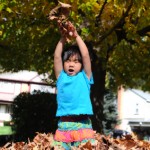 Is it a cold? Is it allergies?
Is it a cold? Is it allergies?
Have you found yourself asking this very question regarding your child’s cough and runny nose? It’s cold and flu season, but it’s also Fall which means a spike in seasonal allergies. So, the coughing, sneezing, and runny noses are a plenty. Problem is, seasonal allergies and viral colds can mimic each other making it difficult for parents and pediatricians alike to diagnose right away.
However, there are some signs that strongly suggest seasonal allergies in your child. If you can answer yes to most of these questions, chances are, your child is dealing with seasonal allergies versus the common cold.
1. Has your child been sneezing, coughing, and been nasally congested for 2 weeks or more?
Seasonal allergies linger while colds run their course within 7-10 days. Any child with persistent nighttime coughing and nasal congestion beyond the typically time frame for colds should be evaluated for allergies.
2. Is your child’s nasal discharge clear and watery?
While both colds and allergies can start with a clear/watery runny nose. With allergies, they stay that way while colds tend to evolve into thick, yellow to green nasal discharge.
3. Is there a family history of seasonal allergies, eczema, and/or asthma?
Allergies tend to run in families. Also, if your child typically gets allergies at the change of seasons, this could be another clue lending itself to the diagnosis.
4. Is your child older than 3 years old?
It typically takes 2-3 seasons of being exposed to a particular allergen for children to develop an immune response. Hence, children less than 3 do not typically have seasonal allergies.
5. Is your child particularly itchy?
Itchy eyes, throat, and nose are the hallmark of seasonal allergies. While a cold can start out with some itchiness in the throat and nose causing coughing and sneezing; colds evolve into sore throats, possible body aches, and low grade fevers.
So, while Fall lends itself to various colds (I’m fighting one right now) and seasonal allergies alike, it is important to distinguish between the two in order to treat your child appropriately. Now you know at least 5 signs that point to seasonal allergies in your child.
And remember, for colds, have your child drink plenty of water, use a cool mist humidifier, honey (for children older than 1), normal saline nose drops, and time to get your little one back on track. Allergies typically need a daily antihistamine, possibly a nasal spray, and allergen avoidance (wash those hands and faces when coming indoors and before bed) to relieve allergy symptoms.
Have you been stumped lately regarding colds vs. allergies in your child?
Pin It








my son (and his dad) have allergies. he is 4 1/2. he is taking nasacort but the allergist wants to start shots. what age is this recommended? we almost did it around his 4th bday but i was concerned if he had an allergic reaction he wouldn’t tell me until it was too late. Do shots really lessen the chances of a child getting asthma? my husbanc, sis and dad in law all have asthma and allergies. thanks so much!
[…] mimic the symptoms of a common cold with runny nose, congestion, and sore throat. But you should suspect seasonal allergies if your child’s symptoms persist beyond 10-14 days (the time frame when viral colds should […]